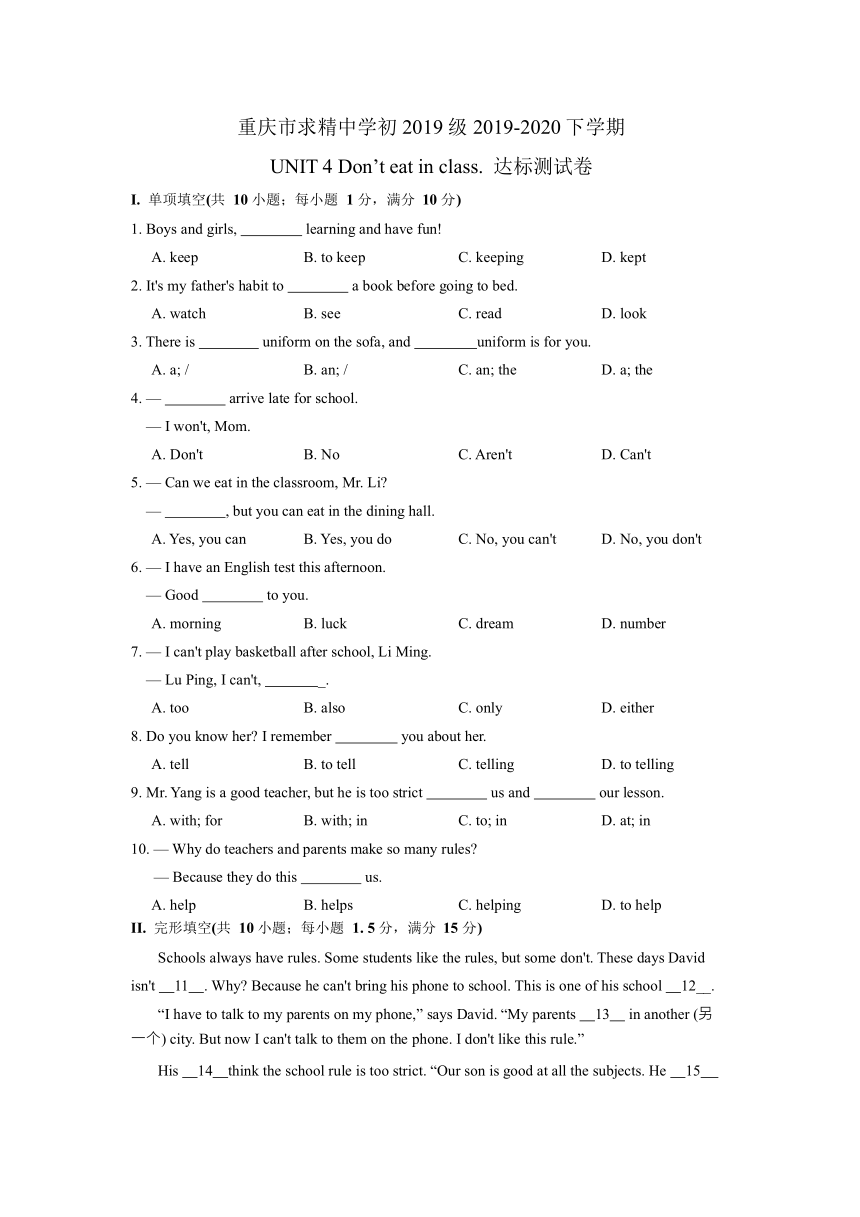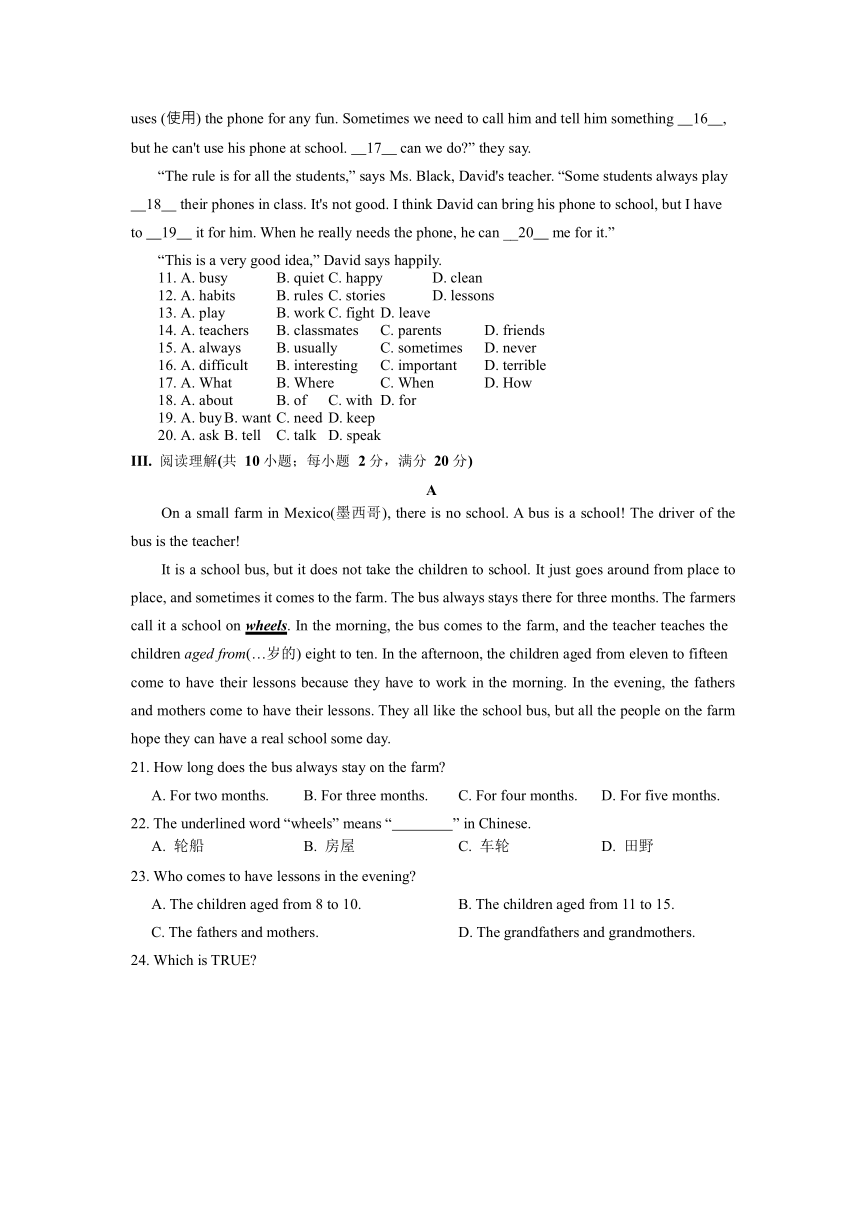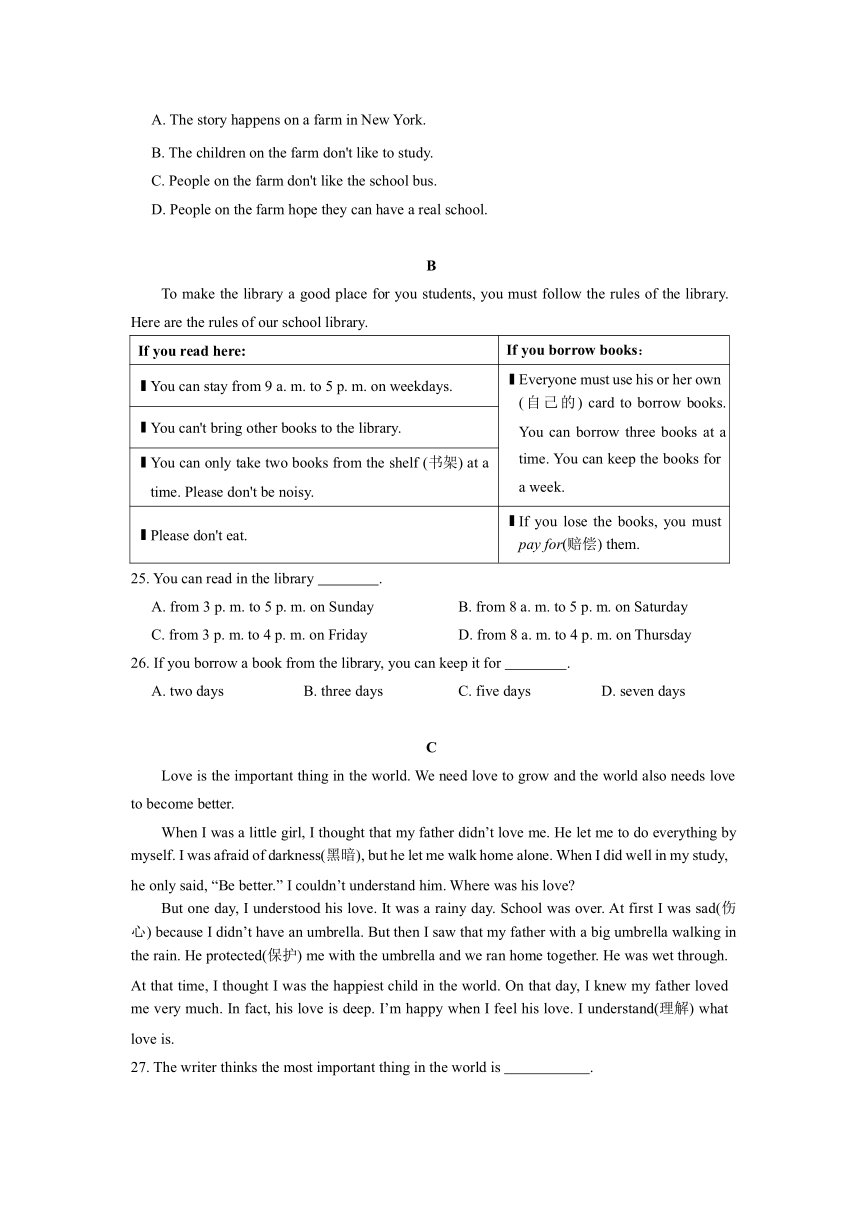七年级下学期Unit 4 Don’t eat in class.单元检测(Word版含答案)
文档属性
| 名称 | 七年级下学期Unit 4 Don’t eat in class.单元检测(Word版含答案) |

|
|
| 格式 | zip | ||
| 文件大小 | 151.0KB | ||
| 资源类型 | 教案 | ||
| 版本资源 | 人教新目标(Go for it)版 | ||
| 科目 | 英语 | ||
| 更新时间 | 2020-04-03 00:00:00 | ||
图片预览



文档简介
重庆市求精中学初 2019 级 2019-2020 下学期
UNIT 4 Don’t eat in class. 达标测试卷
I. 单项填空(共 10 小题;每小题 1 分,满分 10 分)
1. Boys and girls, learning and have fun!
A. keep B. to keep C. keeping D. kept
2. It's my father's habit to a book before going to bed.
A. watch B. see C. read D. look
3. There is uniform on the sofa, and uniform is for you.
A. a; / B. an; / C. an; the D. a; the
4. — arrive late for school.
— I won't, Mom.
A. Don't B. No C. Aren't D. Can't
5. — Can we eat in the classroom, Mr. Li?
— , but you can eat in the dining hall.
A. Yes, you can B. Yes, you do C. No, you can't D. No, you don't
6. — I have an English test this afternoon.
— Good to you.
A. morning B. luck C. dream D. number
7. — I can't play basketball after school, Li Ming.
— Lu Ping, I can't, _.
A. too B. also C. only D. either
8. Do you know her? I remember you about her.
A. tell B. to tell C. telling D. to telling
9. Mr. Yang is a good teacher, but he is too strict us and our lesson.
A. with; for B. with; in C. to; in D. at; in
10. — Why do teachers and parents make so many rules?
— Because they do this us.
A. help B. helps C. helping D. to help
II. 完形填空(共 10 小题;每小题 1. 5 分,满分 15 分)
Schools always have rules. Some students like the rules, but some don't. These days David isn't 11 . Why? Because he can't bring his phone to school. This is one of his school 12__.
“I have to talk to my parents on my phone,” says David. “My parents 13 in another (另
一个) city. But now I can't talk to them on the phone. I don't like this rule.”
His 14 think the school rule is too strict. “Our son is good at all the subjects. He 15
uses (使用) the phone for any fun. Sometimes we need to call him and tell him something 16 ,
but he can't use his phone at school. 17 can we do?” they say.
“The rule is for all the students,” says Ms. Black, David's teacher. “Some students always play
18 their phones in class. It's not good. I think David can bring his phone to school, but I have to 19 it for him. When he really needs the phone, he can __20 me for it.”
“This is a very good idea,” David says happily.
11. A. busy B. quiet C. happy D. clean
12. A. habits B. rules C. stories D. lessons
13. A. play B. work C. fight D. leave
14. A. teachers B. classmates C. parents D. friends
15. A. always B. usually C. sometimes D. never
16. A. difficult B. interesting C. important D. terrible
17. A. What B. Where C. When D. How
18. A. about B. of C. with D. for
19. A. buy B. want C. need D. keep
20. A. ask B. tell C. talk D. speak
III. 阅读理解(共 10 小题;每小题 2 分,满分 20 分)
A
On a small farm in Mexico(墨西哥), there is no school. A bus is a school! The driver of the bus is the teacher!
It is a school bus, but it does not take the children to school. It just goes around from place to place, and sometimes it comes to the farm. The bus always stays there for three months. The farmers call it a school on wheels. In the morning, the bus comes to the farm, and the teacher teaches the
children aged from(…岁的) eight to ten. In the afternoon, the children aged from eleven to fifteen
come to have their lessons because they have to work in the morning. In the evening, the fathers and mothers come to have their lessons. They all like the school bus, but all the people on the farm hope they can have a real school some day.
21. How long does the bus always stay on the farm?
A. For two months. B. For three months. C. For four months. D. For five months.
22. The underlined word “wheels” means “ ” in Chinese.
A. 轮船 B. 房屋 C. 车轮 D. 田野
23. Who comes to have lessons in the evening?
A. The children aged from 8 to 10. B. The children aged from 11 to 15.
C. The fathers and mothers. D. The grandfathers and grandmothers.
24. Which is TRUE?
A. The story happens on a farm in New York.
B. The children on the farm don't like to study. C. People on the farm don't like the school bus.
D. People on the farm hope they can have a real school.
B
To make the library a good place for you students, you must follow the rules of the library. Here are the rules of our school library.
If you read here: If you borrow books:
l You can stay from 9 a. m. to 5 p. m. on weekdays. l Everyone must use his or her own(自己的) card to borrow books. You can borrow three books at a time. You can keep the books fora week.
l You can't bring other books to the library.
l You can only take two books from the shelf (书架) at atime. Please don't be noisy.
l Please don't eat. l If you lose the books, you mustpay for(赔偿) them.
25. You can read in the library .
A. from 3 p. m. to 5 p. m. on Sunday B. from 8 a. m. to 5 p. m. on Saturday
C. from 3 p. m. to 4 p. m. on Friday D. from 8 a. m. to 4 p. m. on Thursday
26. If you borrow a book from the library, you can keep it for .
A. two days B. three days C. five days D. seven days
C
Love is the important thing in the world. We need love to grow and the world also needs love to become better.
When I was a little girl, I thought that my father didn’t love me. He let me to do everything by myself. I was afraid of darkness(黑暗), but he let me walk home alone. When I did well in my study,
he only said, “Be better.” I couldn’t understand him. Where was his love?
But one day, I understood his love. It was a rainy day. School was over. At first I was sad(伤 心) because I didn’t have an umbrella. But then I saw that my father with a big umbrella walking in the rain. He protected(保护) me with the umbrella and we ran home together. He was wet through.
At that time, I thought I was the happiest child in the world. On that day, I knew my father loved me very much. In fact, his love is deep. I’m happy when I feel his love. I understand(理解) what
love is.
27. The writer thinks the most important thing in the world is .
A. money B. time C. love D. happiness
28. The girl was sad on a rainy school day because .
A. she didn’t see his father B. she was afraid
C. she didn’t have an umbrella D. she was wet
29. Why did the writer think she was the happiest child?
A. Because she had an umbrella. B. Because she went home safely.
C. Because she saw her father in the rain. D. Because her father loved her very much.
30. The girl thinks father’s love is
A. kind B. deep C. interesting D. important
IV. 补全对话(共 5 小题;每小题 1 分,满分 5 分) A:I don't have any fun these days.
B:(31)
A:Because I have many rules at home.
B:(32)
A:I can't go out with my friends on school nights.
B:(33)
A:Yes, I have to clean my room.
B:What other things do you have to do?
A:(34) I don't want to follow the rules. B:I think they are good for you. (35)
A:Maybe you're right.
A. I also have to do the dishes after dinner. B. Do you have to do the housework?
C. Why?
D. When do you do your homework? E. What are they?
F. You have to follow them.
G. You don't need to follow them.
V. 任务型阅读(共 4 小题;每小题 2 分,满分 8 分)
The Browns and Mary leave the train station for their home. After half an hour, they get to the Browns' home. Mary sees her new home, and she is very happy. She puts her jacket on the bed. Then Mrs. Brown says, “Mary, don't put your dirty jacket on the bed.”
It's time for lunch. Mary is happy because she sees her favorite food chicken on the table. She tastes it and says, “Very nice.” Then Mr. Brown says, “Mary, you can't eat before your grandparents eat. And you mustn't talk when eating.”
After lunch, Mary goes into Peter's room. Peter is not happy. He says, “Mary, you can't come into my room without(没有) asking me.
In the evening, the Browns go to bed but Mary doesn't. She is not happy because she thinks there are too many rules at the Browns' home. With her jacket, Mary goes to the train station. She likes it because there're no rules there.
36. How long does it take Mary to get to the Browns' home?
37. Does Mary like beef best?
38. Why is Mary unhappy?
39. Do you like the rules in your family? Why or why not?
VI. 完成句子,每空一词(共 5 小题;每空 1 分,满分 10 分)
40. You can't bring your basketball to school. (改为祈使句)
your basketball to school.
41. We can relax after doing our homework in class, too. (改为否定句) We relax after doing our homework in class, .
42. He has to do some cooking in the afternoon.(对划线部分提问)
he have to do in the afternoon?
43. 公园里有太多人。(完成译句)
There are people in the park.
44. 最好先给妈妈做早餐。(完成译句)
is to make breakfast for your mom.
VII. 短文填空(共 8 小题;每小题 2 分,满分 16 分)
It isn’t fair(公平的). I have too 45. rules at my home. I have to get up at six o’clock every morning. I 46. meet my friends after school because I have to 47. my homework. I can’t 48. TV on school nights. And I have to be in bed by ten o’clock. 49.
weekends, I have to 50. my bed and clean the room. Then I have to 51.
the dishes. Later I have to 52. to the Children’s palace to learn to play the piano. I am busy all the time.
VIII. 词语运用(共 16 小题;每小题 1 分,满分 16 分)
A) 用所给词适当形式填空。*不一定一空一词
53. (not be) late for class.
54. Tony (not have) to take a shower every day.
55. Please (be) quick. It’s time for class.
56. Mary always helps her mom (clean) the room.
57. Do you have to do the (dish) at home?
58. You mustn’t be (noise) in the library.
59. Mom, can you (read) the story for me?
60. Believe me, he always looks very (relax).
61. My mom is very busy so she has no time to (relax).
62. Tom always practice (play) the piano on the weekend. B) 根据句意及首字母提示或汉语提示完成单词。
63. There are many r in our school.
64. Don’t play (在外面) the house when it’s raining.
65. It’s very i for all of us to study English well.
66. Please cook the fish for me in the k .
67. I think students need to f the school rules.
68. Nancy always (到达) at school on time every day.
I. 1-5 ACDAC 6-10 BDCBD
II. 11-15 CBBCD. 16-20 CACDA
UNIT 4 单元过关卷
III. A) 21-24 BCCD B) 25-26 CD C) 27-30 CCDB IV. 31-35 CEBAF
V. 36. (For) half an hour.
37. No.
38. Because she thinks there are too many rules at the Browns' home.
39.略
VI. 40. Don’t bring 41. can’t; either 42. What does 43. too/so many 44. It; best
VII. 45. many 46. can’t 47. do/finish 48. watch 49. On/At 50. make 51. wash/do 52. go/get
VIII. 53. Don’t be 54. doesn’t have 55. be 56. (to) clean 57. dishes 58. noisy
59. read 60. relaxed 61. relax 62. playing 63. rules 64. outside 65. important
66. kitchen 67. follow 68. arrives
同课章节目录
- Unit 1 Can you play the guitar?
- Section A
- Section B
- Unit 2 What time do you go to school?
- Section A
- Section B
- Unit 3 How do you get to school?
- Section A
- Section B
- Unit 4 Don't eat in class.
- Section A
- Section B
- Unit 5 Why do you like pandas?
- Section A
- Section B
- Unit 6 I'm watching TV.
- Section A
- Section B
- Review of Units 1-6
- Unit 7 It's raining!
- Section A
- Section B
- Unit 8 Is there a post office near here?
- Section A
- Section B
- Unit 9 What does he look like?
- Section A
- Section B
- Unit 10 I'd like some noodles.
- Section A
- Section B
- Unit 11 How was your school trip?
- Section A
- Section B
- Unit 12 What did you do last weekend?
- Section A
- Section B
